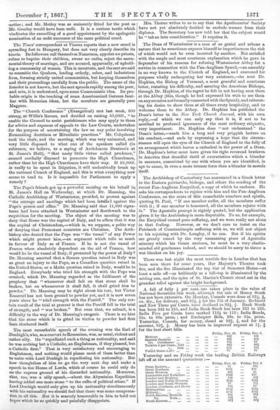The Dean of Westminster is a man of so genial
and urbane a nature that he sometimes exposes himself to impertiuences the risk of which would not be even incurred by another. Not satisfied with the ample and most courteous explanation which he gave in September of his reasons for refusing Westminster Abbey for a service in connection with the Pan-Anglican Synod,—an assembly in no way known to the Church of England, and convened for purposes vitally endangering her very existence,—he sent Dr. Hopkins, the Bishop of Vermont, a most graceful and courteous letter, restating his difficulty, and assuring the American Bishops, through Dr. Hopkins, of the regret he felt in not having seen them at the Abbey (this, though he had expressed his wish to see them on anyoccasion not formally connected with the Synod), and reiterat- ing his desire to show them at all times every hospitality, and to welcome them to the Abbey. Dr. Hopkins has published the Dean's letter in the New York Church Journal, with his own reply,—of which we can only say that it is, if not to be ascribed to profound ignorance of the most ordinary etiquette, very impertinent. Dr. Hopkins does "not understand" the Dean's letter,—reads him a long and very priggish lecture on his conduct,—and ends by expressing a hope that the circum- stances will open the eyes of the Church of England to the folly of an arrangement which leaves a cathedral in the power of a Dean. Dr. Hopkins's letter must have given his right reverend brethren in America that dreadful thrill of excruciation which a blunder in manners, committed by one with whom you are identified, is apt to cause, in even a more intense form than a blunder in morals itself.


































 Previous page
Previous page